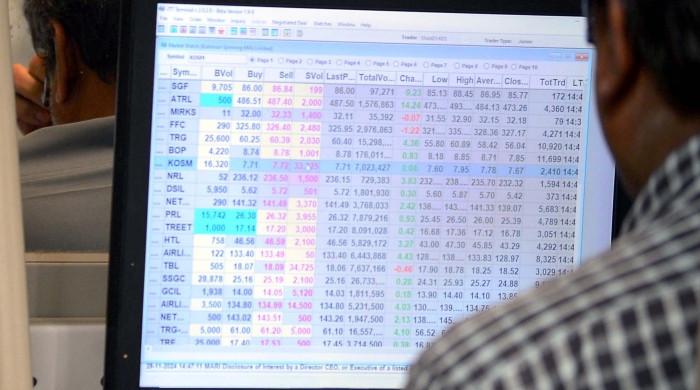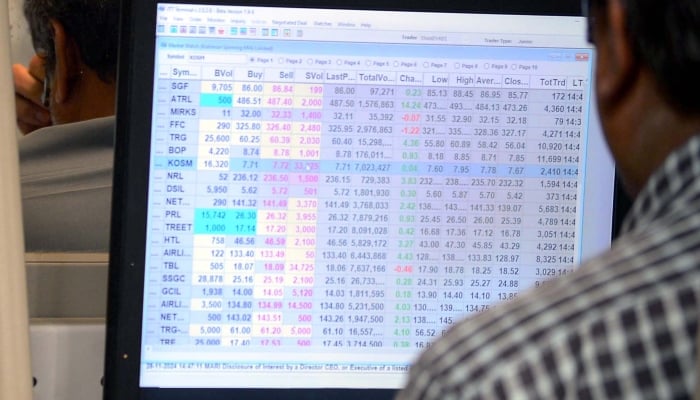PSX faces selling pressure amid foreign outflows

The stock market endured continued selling pressure on Thursday, extending its downward trajectory from the previous session as aggressive profit-taking intensified, compounded by heightened investor caution over rising foreign outflows.
The Pakistan Stock Exchange’s (PSX) benchmark KSE-100 Index dropped 5,003.58 points, or -4.5%, to an intraday low of 106,066.71, extending losses from Wednesday’s historic single-day fall of 4,916.11 points, the largest point-wise decline in PSX history. The index closed Wednesday at 111,070.29 after a session marked by a sharp reversal from early gains.
Ahsan Mehanti, Managing Director and CEO of Arif Habib Commodities, said: “Stocks [are] bearish on concerns for foreign outflows and cautious SBP policy easing on susceptible multiple risks.
Consolidation in blue-chip scrips, rupee instability, and weak global crude oil prices played a catalyst role in bearish activity.”
Data from the SBP showed a sharp rise in profit and dividend repatriations by multinational companies. Repatriations surged by 112% year-on-year to $1.128 billion during the first five months of FY25, reflecting unrestricted dollar outflows amidst improved foreign exchange reserves.
November alone accounted for $321.6 million, a 586% year-on-year increase, though this represented a 22.3% month-on-month decline due to the clearing of pending payments and reduced restrictions on capital outflows for foreign investors.
Investor concerns were also heightened by the introduction of The Tax Laws (Amendment) Bill, 2024, which proposes stringent measures targeting non-filers to broaden the tax base.
Key provisions include barring non-filers from purchasing vehicles above 800cc, property, and shares beyond certain limits. The proposed legislation also restricts non-filers from opening bank accounts or making large financial transactions, while empowering the Federal Board of Revenue (FBR) to freeze bank accounts, seal properties, and block property transfers of non-compliant individuals.
These measures sparked fears of reduced consumer spending and liquidity in the banking sector, adding to the bearish tone in the market.
Despite the recent downturn in equities, Pakistan’s macroeconomic fundamentals continue to improve, providing a positive backdrop for long-term investor confidence.
The current account posted a $729 million surplus in November, the largest monthly figure in nearly a decade and the highest since February 2015. For the first five months of FY2025, the current account surplus stood at $944 million, compared to a deficit of $1.67 billion during the same period last year. This turnaround was driven by a reduction in the trade deficit, a decline in the services deficit, and decreased interest and dividend repatriations.
Foreign direct investment (FDI) also showed growth, increasing by 31% year-on-year to $1.124 billion during the first five months of FY2025, with significant contributions from China, Hong Kong, and the United Kingdom.
Meanwhile, remittances grew by 29% year-on-year in November, reaching $2.9 billion, bringing the total for the first five months of FY2025 to $14.8 billion. This growth was supported by government incentives promoting formal banking channels and stable foreign reserves, which now stand at $16.6 billion.
The SBP recently reduced the policy rate by 200 basis points, lowering it to 13%. This marked the fifth consecutive rate cut as inflation dropped to 4.9% in November, the lowest since April 2018.
Source link




